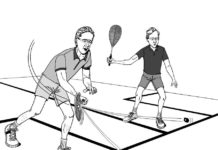By Kevin Klipstein
As the national governing body we generally believe that the more people play squash, the better. That said, moderation in all things is advised, and squash is no exception. An issue that has started to crop up as one in need of addressing is year-round play for juniors. We’ve received some criticism recently that the junior season for squash appears more and more to be year-round.
At a glance, this does seem to be true: the points-based system implemented two years ago does in fact reward participation to some degree, though not as much as results on court. There are also more tournaments on the calendar, and certainly more through the spring and summer. This provides the opportunity for juniors to play tournaments year-round, particularly those attending private schools, or juniors simply playing on a scholastic team, preventing them from competing in tournaments during the traditional winter season.
It’s likely some biases are being brought into the criticism too, based on what is happening in other sports. Overall in the US, it seems that kids today are being encouraged to specialize in sports earlier and earlier. You don’t have to look too long before you hear about kids barely out of diapers on travel teams competing nearly every day of the week, nearly every season of the year. And this for many experts, including those involved in driving sports participation and performance in Canada, is a mistake.
Refreshingly, Canada’s centralized support for sports is rooted in a coaching and leadership initiative called the National Coaching Certification Program (NCCP). This program seeks to develop and enhance the capabilities of instructors, coaches, officials and volunteer leaders of all sports at the grassroots level. NCCP is the coach training and certification program for 65 different sports and is offered in both official languages across Canada, and is the recognized national standard for coach training and certification in Canada.
Their approach is based on the idea that varied skills building in the pre-teen and teenage years is more important than specialized sport skills, and suggests that too much specialization, too early, may be harmful to development. It emphasizes that mastery of a range of motor skills, combined with good overall physical fitness, is critical to the healthy development of a child, and form the basis of their athletic competence. The approach also suggests that a more general approach, taken early on, benefits the athlete when specialization in sports does occur in later teenage years. Even then, participation in at least one other sport is still considered integral to the development process.
Those in the US who argue that in order to achieve a high ranking in squash, or to truly compete at the elite level, requires year-round commitment just need to pay attention to the numerous examples of some of the most successful junior squash players who are multi-sport athletes, who hang up their racquets after Nationals to play on their high school lacrosse or baseball teams instead.
In the end, it’s a choice, and it comes down to what a player wants to get out of the experience. So much is gained from participation in playing competitive squash outside of a ranking. Everything from the basic values of good sportsmanship to learning the discipline required to improve one’s game. Interviewing recent college grads from schools with teams ranked in the teens and twenties, they mostly seem to talk about their commitment to the sport, and more remarkably, their intense dedication to their teammates. These are components of squash completely apart from any results or the competition entirely.
We want squash to be a sport that players enjoy. It’s rare that one looks back and regrets taking a long term perspective on just about anything (excluding the market!). We may want to take note of this in relation to our children’s involvement in sports. Providing opportunities to build skills and experiences in other sports could result in a child who plays even better, and a lifelong love of the sport.





